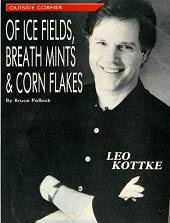Of Ice Fields, Breath Mints & Corn Flakes
by Bruce Pollock

|
"It hit me all of a sudden about two years ago that I've been around for a long time," mentions Kottke, in his laconic baritone. "Somewhere inside of me I never expected that I'd be doing this for this long. It seemed a little outside the realms of possibility. But now I know that with varying degrees of commercial success, I'll be doing this the rest of my life."
Which is not only good news for Kottke's legions of fans, but for anyone who appreciates the sound of an acoustic six and/or twelve string guitar, strummed, plucked, muted. fingerpicked and caressed with confidence and precision. Because, as evidenced by that twenty-first album, My Father's Face, Kottke's touch and taste are as sharp as ever. And as a special bonus on this album Kottke's singing voice is also as droll and poignant as ever, on four vocals, including "Jack Gets Up," the album's centerpiece and one of the most amazing songs of the year, a kind of "Hang on Sloopy" meets Garrison Keillor at the Buffalo Folk Festival.
"I want to do more things like 'Jack Gets Up,' and get back to exploring a little bit of the verbal side of what's available to me," says Kottke, characterizing this period of his life as definitely a time of musical growth. "The most important thing to me right now is developing my knowledge of harmony. I'm actually sitting down and studying it. It's a lifetime deal, of course, and something I've postponed for a lot of years, but I've got a tremendous appetite for it now. It's showing up already a little in my playing, what little I have learned. 'My Aunt Francis', on the album, satisfies more of my curiosity than some of the older harmonic approaches I've taken. I have to be careful, because I love really outside kinds of inventions. I like improvisation that goes completely nuts, but I don't want to lose what's important to me. Something I knew when I was starting out was that I wanted to play stuff that played itself. I wanted to write things that were not some tortured tour of theory, that were generated on the guitar, felt like the guitar, and could be played rather than overcome.
v "There've been times in my career where I was being fatheaded and cerebral. Where I was interfering too much. There's a way to do complicated music so that it fits or floats, and that always has to happen, I don't care if it's Stravinsky. I ran into a woman on a plane once, who was a composer going to some sort of forum. I forget how it came up, but she was writing something, and from what she was writing, it looked really serial and not very tonal. I asked her how she felt about tonality. She just lit into me as if I were tonality itself. She didn't want to hear the least bit of sentiment, romanticism, melody; that was not what music was about. She wanted to explore the math of it and she was dead set on it. I just don't know about that kind of stuff. I've heard some of it that I like, but I'm not convinced when it's really working that they've avoided sentiment, because I don't see how a listener can help but impose his own."
Kottke's own songwriting has gone through an expansionist phase, too. "ln the beginning, A-A-B-A was enough for me, and now I want to really exercise the other stuff that I've learned. There's a tune called 'Ice Fields' that I just love, that's really satisfying to me, because I recorded it wrong, it's a bad arrangement on the record, I played it a million different ways for audiences, and each time I thought I figured it out. I worked on it for, I'd say, a year and a half after I recorded it, and it would really bomb most of the time, but I knew it was a good piece. I had never had this experience, and then finally I got it, and now I play it as often as I can, because it's different from a lot of my stuff. It opens up a new part in my set and it's so satisfying, because I involved a lot more than I used to in the writing of it. It was also one of the few times when I had heard of something that I wanted to try to approximate musically, and that was this thing called an ice field that forms in Lake Superior, at the wrong time usually, and it traps boats there for two or three months that were intending to just go right on up the Saint Lawrence and out to the Atlantic. So these boats would get stuck in the middle of a perfectly flat horizon and a gray sky, and sit there for a long time. That just struck me.
So I tried to answer that feeling with this piece. I decided that I wanted to write a piece that did the same thing, literally, all the time, but I wanted to do it so that you didn't know it was doing that. I started out with a three-note figure, and that was it. And I'd make subtractions and additions, and I'd turn some things around, but it would stay there, and it did throughout the whole piece. I was trying, without developing the kind of stuff that puts you to sleep, to find something that would make a virtue out of tedium, which is how a friend of mine once defined Moby Dick."